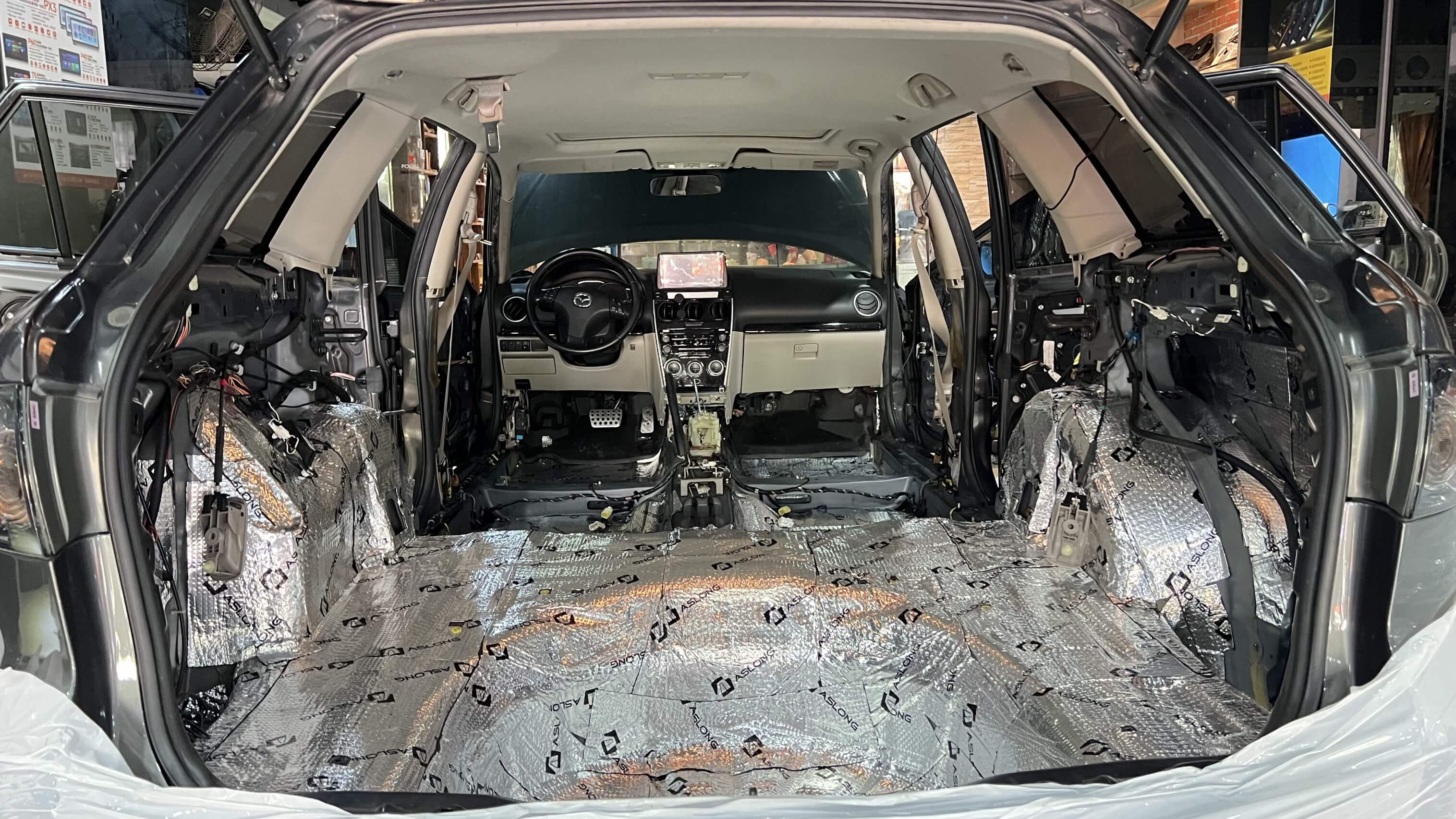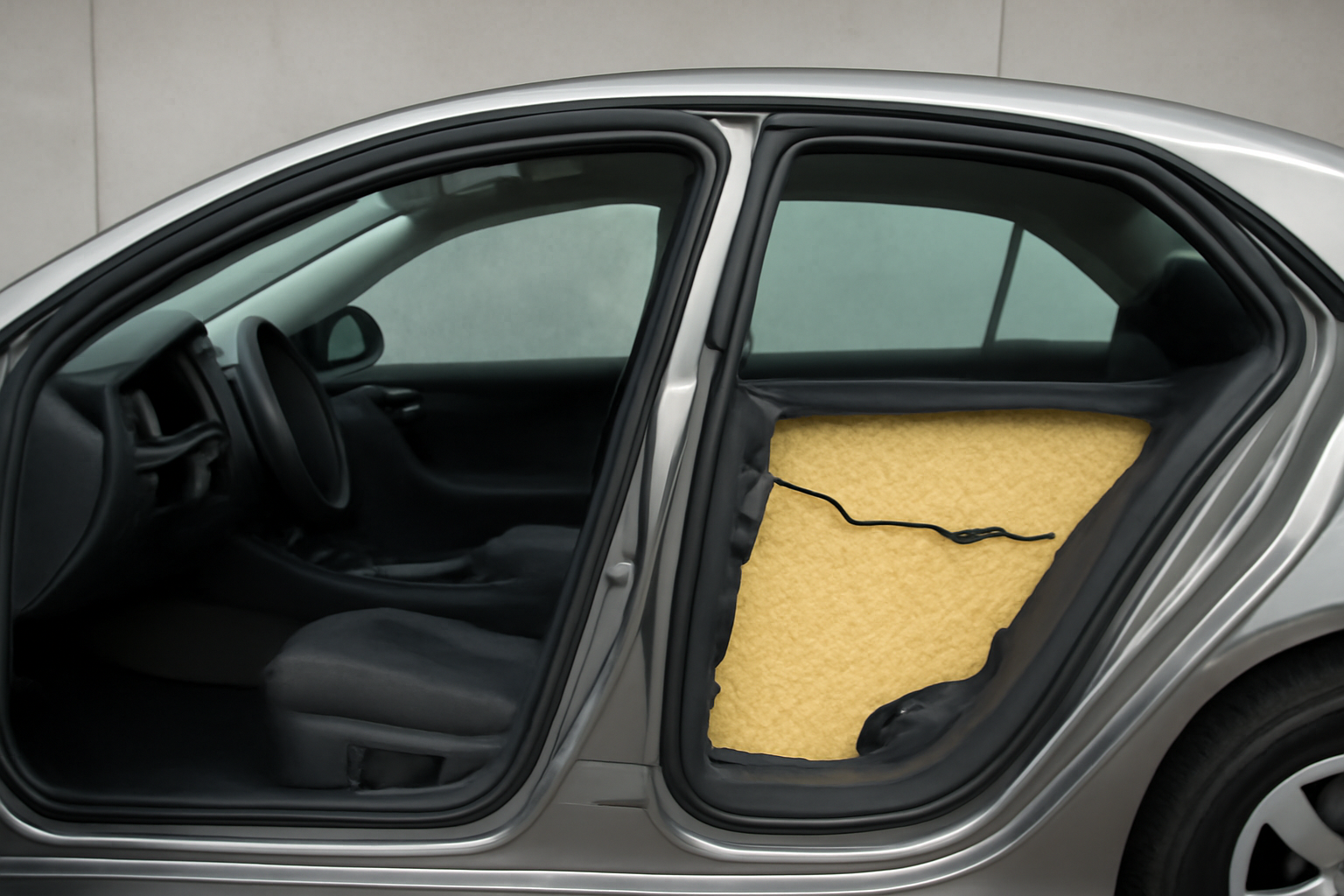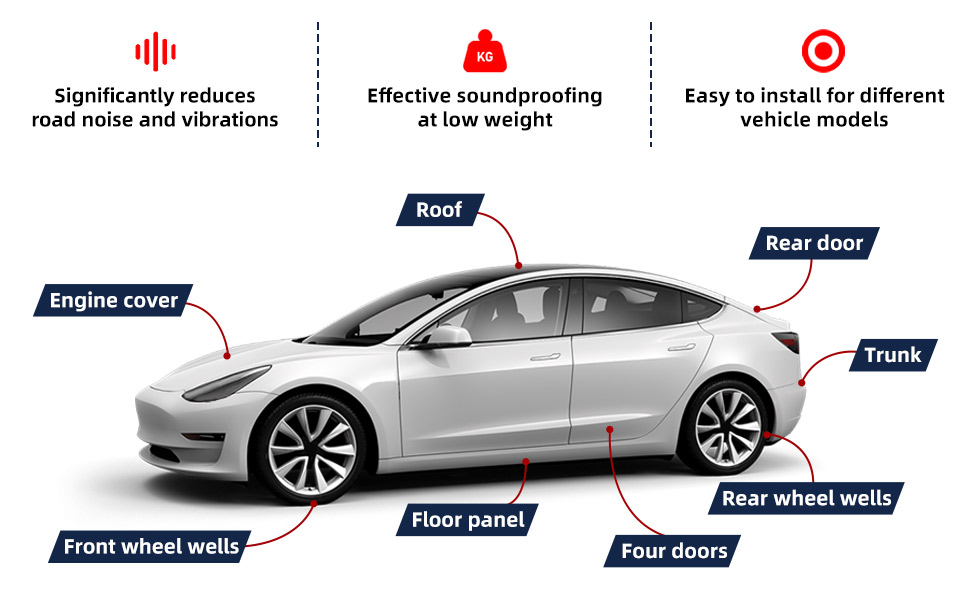How to Choose the Right Insulation Material for Your Car or Home
Choosing the right insulation material is essential for creating a comfortable, energy-efficient, and noise-controlled environment — whether in your car or your home. With so many insulation products available on the market today, it can be difficult to understand which one suits your needs best.
This guide breaks down the differences between common insulation materials, their benefits, and how to choose the right option for your specific situation.
- Why Insulation Matters
- 1. Soundproofing (Noise Reduction)
- 2. Thermal Control (Heat Insulation)
- Types of Insulation Materials
- 1. Butyl Rubber Sound Deadening Mats (Automotive/Industrial)
- Best for:
- Benefits:
- Why Choose Butyl Rubber:
- 2. Acoustic Foam Panels (Home / Studio)
- Best for:
- Benefits:
- Important Note:
- 3. Aluminum Foil Heat Insulation (Car & Home)
- Best for:
- Benefits:
- 4. Fiberglass Insulation (Home)
- Best for:
- Benefits:
- 5. Multi-Layer Composite Mats (Car + Home)
- Best for:
- Benefits:
- How to Choose the Right Material for Your Needs
- For Cars
- 1. To Reduce Road Noise
- 2. To Reduce Engine Heat & Noise
- 3. For Better Audio Quality
- 4. For Sun Heat Reduction
- For Homes
- 1. To Block Outside Noise (neighbors, traffic)
- 2. To Improve Room Acoustics (echo, reverb)
- 3. To Improve Temperature Efficiency
- Key Factors to Consider When Choosing Insulation
- 1. What is your main goal?
- 2. Where will it be installed?
- 3. Thickness Requirements
- 4. Durability & Safety
- 5. Budget
- Best Recommended Combination for Maximum Performance
- For Cars:
- For Homes:
- Conclusion
- FAQ: Frequently Asked Questions
- 1. What is the best insulation material for cars?
- 2. What is the difference between soundproofing and thermal insulation?
- 3. Is acoustic foam suitable for car insulation?
- 4. What insulation is best for home walls and attics?
- 5. Can I install insulation materials by myself?
- 6. Do insulation materials have an odor or release harmful chemicals?
- 7. How thick should insulation be?
- 8. Do I need both soundproofing and heat insulation?
- 9. Is multi-layer composite insulation worth it?
Why Insulation Matters
Insulation plays two major roles:
1. Soundproofing (Noise Reduction)
The right material can reduce unwanted noise from traffic, engines, neighbors, machinery, or road vibration.
2. Thermal Control (Heat Insulation)
Good insulation keeps heat where it should be — preventing hot car cabins, lowering energy consumption in homes, and improving temperature stability.
Choosing the best insulation starts with understanding what problem you want to solve.
Types of Insulation Materials
Below are the most common insulation materials used in vehicles and homes — each offering different advantages.
1. Butyl Rubber Sound Deadening Mats (Automotive/Industrial)

Best for:
Cars, vans, trucks, machinery, workshops.
Benefits:
-
Excellent vibration damping
-
Strong sound blocking
-
High heat resistance
-
Adhesive backing for easy installation
-
No odor, no melting
-
Perfect for car floor, doors, trunk, firewall
Why Choose Butyl Rubber:
If your main goal is noise reduction + heat insulation, especially in cars, butyl mats are the most reliable and long-lasting option.
2. Acoustic Foam Panels (Home / Studio)

Best for:
Home theaters, bedrooms, offices, recording studios.
Benefits:
-
Absorb echo
-
Reduce reverberation
-
Improve music and speech clarity
Important Note:
Acoustic foam does not block sound — it only controls echo inside a room.
Ideal for improving sound quality but not for blocking outside noise.
3. Aluminum Foil Heat Insulation (Car & Home)

Best for:
Car roofs, engine compartments, home attic, HVAC systems.
Benefits:
-
Reflects radiant heat
-
Lightweight
-
Works well in combination with butyl sound deadener
-
Good for high-temperature environments
If you want to reduce heat coming from the sun or engine — this is a top choice.
4. Fiberglass Insulation (Home)
Best for:
Walls, attics, basements, ceilings.
Benefits:
-
Strong thermal insulation
-
Cost-effective
-
Good sound absorption
-
Long-lasting performance
Not suitable for cars due to dust, shedding, and installation difficulty.
5. Multi-Layer Composite Mats (Car + Home)
(Butyl layer + Foam layer + Aluminum foil)
Best for:
Users who want both noise reduction and heat control at the same time.
Benefits:
-
Blocks vibration
-
Absorbs sound
-
Reflects heat
-
Safe for both vehicles and buildings
-
Great for premium insulation projects
This is the most versatile all-in-one solution.
How to Choose the Right Material for Your Needs
Below are practical recommendations based on whether you are insulating a car or a home.
For Cars

1. To Reduce Road Noise
Choose:
👉 Butyl rubber sound deadening mats (2mm–3mm)
Apply on:
-
Floor
-
Trunk
-
Wheel arches
2. To Reduce Engine Heat & Noise
Choose:
👉 Butyl mats + Aluminum foil heat shield
Apply on:
-
Firewall
-
Hood
3. For Better Audio Quality
Choose:
👉 Butyl mats inside doors
Improves speaker bass and reduces vibration.
4. For Sun Heat Reduction
Choose:
👉 Reflective foil insulation
Apply on:
-
Roof
-
Ceiling panels
For Homes
1. To Block Outside Noise (neighbors, traffic)
Choose:
👉 Mass Loaded Vinyl (MLV)
👉 Drywall + insulation combination
👉 Thicker composite panels
2. To Improve Room Acoustics (echo, reverb)
Choose:
👉 Acoustic foam or acoustic panels
👉 Bass traps for studios
3. To Improve Temperature Efficiency
Choose:
👉 Fiberglass insulation
👉 Foam board insulation
👉 Reflective foil in attic
Key Factors to Consider When Choosing Insulation
1. What is your main goal?
-
Noise reduction
-
Heat insulation
-
Both
-
Acoustic improvement
This determines your material type.
2. Where will it be installed?
-
Car?
-
Home?
-
Machinery?
-
Outdoor area?
Different locations require different materials.
3. Thickness Requirements
-
Doors & roof: 1.5–2mm
-
Floor & trunk: 2–3mm
-
Wall insulation: depends on cavity space
-
Heat shield: use foil + foam combinations
4. Durability & Safety
-
High heat resistance for cars
-
Fire resistance for home insulation
-
Moisture resistance for basements and automotive floors
5. Budget
Choosing the right insulation doesn't mean choosing the most expensive — but choosing the correct material.
Best Recommended Combination for Maximum Performance
For Cars:
✔ Butyl sound deadening mat (vibration + noise)
✔ Aluminum foil heat insulation (sun + engine heat)
✔ Foam liner (refined acoustic absorption)
For Homes:
✔ Fiberglass insulation in walls
✔ Acoustic panels inside rooms
✔ MLV if heavy sound blocking is needed
Conclusion
Choosing the right insulation material for your car or home depends on understanding your goals — whether it’s noise reduction, heat control, or both.
If you want better driving comfort, lower energy costs, or a quieter living space, the right insulation material will deliver long-lasting results.
For most users, butyl rubber + aluminum foil composite materials offer the best balance of soundproofing, heat insulation, safety, and durability — making them ideal for both automotive and residential applications.
FAQ: Frequently Asked Questions
1. What is the best insulation material for cars?
For most vehicles, butyl rubber sound deadening mats are the best choice because they provide excellent vibration damping, noise reduction, and heat resistance. For additional thermal protection, many users combine butyl mats with aluminum foil heat insulation or foam liners.
2. What is the difference between soundproofing and thermal insulation?
Soundproofing focuses on blocking or absorbing noise (vibrations), while thermal insulation focuses on reducing heat transfer. Some materials—like multi-layer composite mats—offer both benefits, but most materials specialize in one area.
3. Is acoustic foam suitable for car insulation?
Not really. Acoustic foam is mainly for indoor sound absorption, such as bedrooms, recording studios, or offices. It helps with echo control, but it does not block noise and is not heat-resistant enough for automotive use.
4. What insulation is best for home walls and attics?
For home use, fiberglass insulation is one of the most cost-effective and widely used materials. It provides excellent thermal performance, is affordable, and easy to install. Multi-layer composite panels can be used for areas needing both sound and heat control.
5. Can I install insulation materials by myself?
Yes, many insulation products—especially butyl mats, foam liners, and aluminum foil rolls—are DIY-friendly. However, fiberglass insulation may require proper protective gear due to fiber particles.
6. Do insulation materials have an odor or release harmful chemicals?
High-quality insulation materials such as pure butyl rubber mats are odorless and do not melt or release harmful substances. Avoid cheap asphalt-based products, as they may smell and soften under high heat.
7. How thick should insulation be?
This depends on your purpose:
-
Soundproofing: Heavier and denser materials work best (e.g., 2–3 mm butyl mats).
-
Heat insulation: Thickness matters, but reflective surfaces (like aluminum foil) are equally important.
-
Home insulation: Fiberglass thickness commonly ranges from 50–100 mm based on climate and structure.
8. Do I need both soundproofing and heat insulation?
If you want maximum comfort—especially in cars, workshops, or home studios—combining both is recommended. Butyl mats handle vibrations and noise, while foam or foil materials handle heat.
9. Is multi-layer composite insulation worth it?
Yes, if you want a one-product solution that handles both noise and temperature control. It saves installation time and provides a balanced performance for cars and homes.

The Complete Guide to Mass Loaded Vinyl 2026: Does MLV Work For Soundproofing?

High Performance Car Sound Deadening Material for Automotive Insulation

Does Installing Soundproofing Products Damage Your Vehicle?

The 10 Best Sound Absorbing Materials (2026): The Ultimate Buyer’s Guide to Professional Noise Control

OEM & Wholesale Car Sound Deadening Mat for All Vehicle Types | Automotive Noise Control Solutions
FAQs
How to customize products that meet the needs of my industry?
You only need to contact our sales or technical team, we will conduct an in-depth analysis based on your industry needs and provide tailor-made products and solutions. We guarantee to provide you with efficient and accurate services to meet your personalized requirements.
What industries are the products provided by ASLONG suitable for?
ASLONG's products are suitable for multiple industries, including air conditioning and HVAC, construction and waterproofing, automobiles and transportation, home appliances and electronics, industrial equipment and machinery, etc. We provide customized solutions for each industry to meet different needs.
What specific functions can ASLONG's products provide?
Our products cover functions such as insulation, sound insulation, shock absorption, waterproofing and sealing, and are widely used in improving energy efficiency, reducing noise, controlling vibration, protecting equipment, etc., helping customers optimize engineering effects and improve user experience.
Do ASLONG's products meet environmental protection standards?
Yes, all ASLONG products comply with ISO14001 environmental management system certification and global environmental protection standards. We use environmentally friendly materials and are committed to providing sustainable solutions to help customers achieve green development goals.
Does ASLONG provide after-sales service?
Yes, we provide a full range of after-sales services, including technical support, installation guidance, product maintenance and quality tracking, etc., to ensure that each project goes smoothly and continues to perform at its best.

Butyl Rubber Sound Damping Mat
ASLONG Butyl Rubber Sound Damping Mat for sale. Effectively reduces noise and vibrations. High-quality butyl rubber ensures superior performance and durability. Ideal for automotive, industrial, and home applications.

Mass Loaded Vinyl
ASLONG Mass Loaded Vinyl for sale. Reduce noise pollution effectively with our high-quality, mass-loaded vinyl. Ideal for soundproofing walls, floors, and more. Buy now and experience the difference!

Egg Crate Foam
ASLONG Egg Crate Foam for sale. Lightweight, breathable, and comfortable, our egg crate foam provides superior support and pressure relief. Perfect for mattresses, cushions, cars, construction industry, KTV, factories, etc.

NBR Foam
ASLONG NBR Foam: Wholesale NBR foam solutions for diverse applications. High-quality, durable, and competitively priced. Contact us today for bulk orders.

Multi layer Composite NBR foam
ASLONG's multi-layer composite NBR foam is your premium choice for superior cushioning and durability. Ideal for diverse applications, this high-quality NBR foam is available for sale now. Contact us for bulk orders.

Sound Absorbing White Cotton
Sound-absorbing white cotton Made from PP and PET fibres by melt-blowing, special processes are used to achieve density diversification, sound absorption and noise reduction, thermal insulation, moisture-proof and mold resistance.

Puncture-Proof Soundproof Tire Foam, Self-Sealing Noise-Reducing Liner for Cars, Anti-Puncture Wheel Protection, Anti-Puncture Noise Reduction

Tire Silent Foam with Special Glue
ASLONG Tire Silent Foam with special glue effectively reduces tire noise. Improve your vehicle's ride comfort. Buy ASLONG Tire Silent Foam for sale now and experience the quiet difference.
Professional support at any time
Contact us for a free quote on our new soundproofing materials!
© 2026 ASLONG All Rights Reserved. Privacy Policy | Terms and Conditions | Sitemap



Whatsapp: +8613242879341
ASLONG Global
ASLONG
Aslong_global